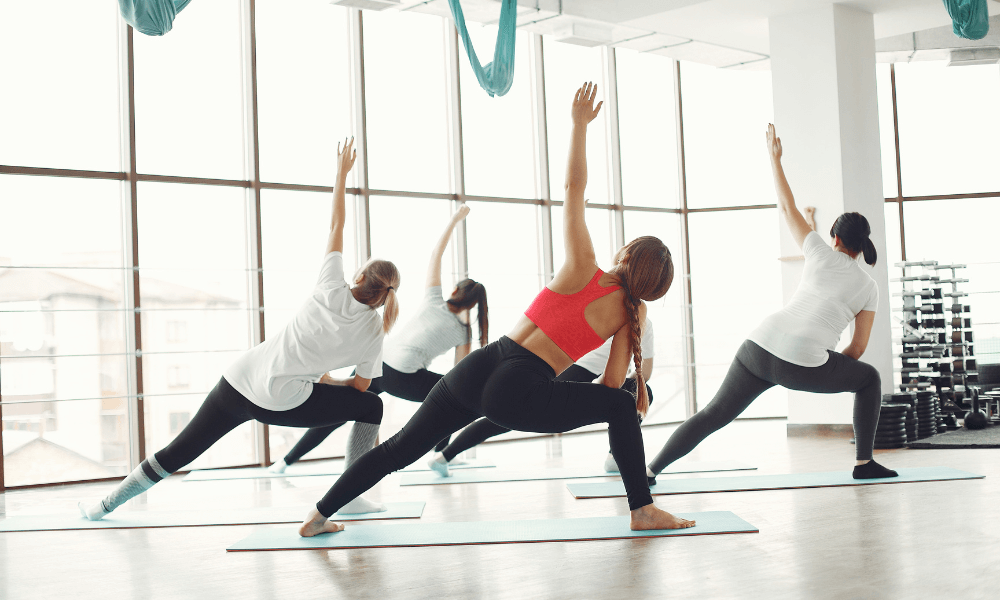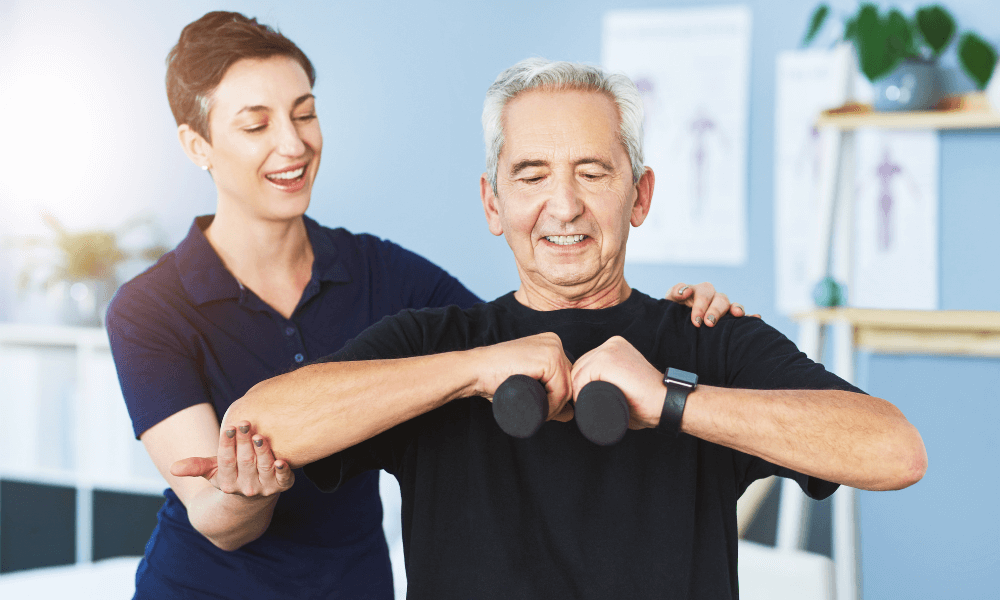Contents
- 1 Why Is Fitness Important: The Foundations of a Healthy Lifestyle:
- 1.1 Physical Benefits of Fitness:
- 1.2 Improving Flexibility and Mobility
- 1.3 Boosting Immune Function
- 1.4 Mental and Emotional Well-Being:
- 1.5 Reducing Stress and Anxiety
- 1.6 Elevating Mood and Self-Esteem
- 1.7 Enhancing Cognitive Function
- 1.8 Longevity and Quality of Life:
- 1.9 Preventing Chronic Diseases
- 1.10 Promoting Independence in Later Years
- 1.11 Fitness and Social Interaction:
- 1.12 Fostering Connections and Relationships
- 1.13 Participating in Group Activities
- 1.14 Building Healthy Habits for Life:
- 1.15 Establishing Consistent Routines
- 1.16 Setting Realistic Goals
- 1.17 Embracing Variety in Workouts
- 1.18 Overcoming Challenges on the Fitness Journey:
- 1.19 Nutrition’s Role in Fitness:
- 1.20 Balancing Macronutrients
- 1.21 The Mind-Body Connection:
- 1.22 Fitness for All Ages and Abilities:
Why Is Fitness Important: The Foundations of a Healthy Lifestyle:
Keeping in good physical shape may seem impossible in today’s hectic world full of competing priorities and distractions. The importance of fitness, however, can’t be stressed enough. Taking care of oneself by exercising regularly, eating healthily, and living stress-free can have far-reaching benefits. This article explores the many ways in which physical fitness benefits our lives, both emotionally and physically.

Introduction:
- Keeping fit and active has many benefits beyond superficial appearances. It’s an essential building block for good health. Our health, vitality, and longevity are all directly impacted by how much we exercise regularly and pay attention to the food we put into our bodies. Let’s examine how fitness can improve your life and determine why it’s so important.
Physical Benefits of Fitness:
Enhancing Cardiovascular Health
Improving one’s cardiovascular fitness has numerous health benefits. Jogging, cycling, and swimming are all great aerobic exercises that can help strengthen the heart muscle and make it more efficient at pumping blood and oxygen throughout the body. The result is improved lung function and circulation, which lowers the danger of cardiovascular diseases like hypertension and stroke. Cardiovascular exercise also aids in reducing “bad” cholesterol and encouraging the growth of healthy blood vessels, both of which ultimately lead to a healthier cardiovascular system.
Strengthening Muscles and Bones
Strengthening of muscles and bones is a side effect of participating in fitness activities. Weightlifting and other resistance exercises build muscle and increase stamina in the gym. As a result, physical performance increases, and the spine and joints’ stability increases. Walking, running, and dancing are all examples of weight-bearing exercises that increase bone density through the stress they place on the bones and thus decrease the likelihood of osteoporosis and related fractures. Participation in these activities regularly helps to develop a strong musculoskeletal system, which in turn improves one’s strength and range of motion.

Improving Flexibility and Mobility
- Flexibility and mobility can benefit greatly from regular exercise. Increased mobility and flexibility result from regular practice of stretching exercises and activities such as yoga and Pilates. Benefits of increased flexibility include better posture, less muscle stiffness, and fewer injuries. As a bonus, the increased mobility that comes from fitness practices makes daily movements easier and improves functional capability, leading to a more dynamic and satisfying way of life.
Managing Weight and Body Composition
- Physical fitness is essential for controlling one’s weight and shape. Combining regular exercise with a healthy diet is an effective way to lose weight and bulk up. This double whammy helps you shed pounds and makes you healthier overall by decreasing your body fat percentage. Fitness efforts improve health and well-being by making it easier to maintain a healthy weight by increasing metabolic rate and decreasing fat storage.
Boosting Immune Function
- The immune system can benefit from engaging in regular physical activity. Evidence shows that regular exercise improves the immune system’s ability to detect and respond to infections. In addition, regular exercise helps lower levels of immune-compromising compounds such as inflammation and oxidative stress. Increased fitness improves long-term health and resilience by lowering the body’s susceptibility to illness and infection.

Mental and Emotional Well-Being:
Reducing Stress and Anxiety
- Physical fitness is critically important because of its ability to alleviate psychological strain. Endorphins are “feel-good” hormones that are released in response to regular physical activity. These hormones contribute to an overall sense of contentment and calmness. Stress hormones like cortisol are also regulated by exercise, leading to less overall stress. In addition, the intensity of your workout forces you to shut out the distractions of everyday life, which can help you gain perspective and calm your nerves. This two-pronged mechanism highlights the importance of fitness as a means to psychological stability.
Elevating Mood and Self-Esteem
- The importance of fitness in improving mood and self-esteem cannot be overstated. Endorphins are natural mood enhancers that are released in response to physical activity. These endorphins help people feel happier and more upbeat. Achieving one’s fitness goals is a great way to boost one’s mood and confidence, boosting one’s sense of worth. Additionally, the confidence and pride that come from working on your physical fitness also benefit your perception of yourself and your body. Physical fitness is crucial in developing an optimistic worldview and solid identity.
Enhancing Cognitive Function
- Regarding improving one’s brainpower, fitness ranks high on the list of priorities. Exercising regularly has been shown to increase blood flow to the brain, which carries oxygen and nutrients that are vital to brain health. In addition to enhancing cognitive abilities like memory, focus, and problem-solving, exercise also releases neurotrophic factors. In addition, fitness helps lower levels of oxidative stress and brain inflammation, both of which have been linked to slowed mental function as we age. By promoting brain health, fitness becomes an essential tool in the fight against cognitive decline.

Longevity and Quality of Life:
Preventing Chronic Diseases
To avoid developing chronic illnesses, it is crucial to keep up with your fitness routine. Weight management, blood pressure regulation, and blood sugar control are all crucial in reducing the risk of conditions like obesity, type 2 diabetes, and cardiovascular ailments, and they are all closely linked to regular physical activity. The immune system, inflammation, and cardiovascular system are all bolstered by exercise, making it a potent weapon against a wide range of chronic diseases. By prioritizing physical activity, people can protect their health, increase their lifespan, and enhance their quality of life.
Promoting Independence in Later Years
When you consider fitness’s ability to foster autonomy in later life, you begin to appreciate its true significance. Maintaining a high level of muscle strength, equilibrium, and mobility throughout life is aided by consistent physical activity. The elderly are particularly vulnerable to the debilitating effects of slips, trips, and falls, making these characteristics essential. In addition, regular exercise improves cardiovascular health and brain function, which helps seniors maintain their independence, social lives, and active lifestyles. When people emphasize staying physically fit, they are more likely to maintain their independence and happiness as they get older.

Fitness and Social Interaction:
Fostering Connections and Relationships
Maintaining a healthy body and mind is essential for building and maintaining meaningful relationships. Participating in team sports, fitness classes, or other group activities is a great way to meet new people and strengthen existing friendships. Friends and coworkers are bound closer together by working toward common fitness goals. In addition, working out with a friend, family member, or workout partner strengthens bonds of friendship and community. A sense of community and belonging is fostered through these interactions, and individuals’ lives are enriched as a result of the commonalities they foster.
Participating in Group Activities
Participating in group activities, where one’s fitness level will be tested, places a premium on physical fitness. There are many benefits to working out with other people. When people work out with others who share their interests and goals, they are more likely to complete their workouts consistently. Participating in a group activity is a great way to meet new people, which can greatly improve your mood and sense of well-being. Improved performance and continued commitment to fitness goals can result from the motivational aspect of friendly competition and encouragement within a group dynamic. In the end, it’s not just that group fitness activities improve health; they also foster a sense of community and support, making the whole process of getting healthier much more rewarding.

Building Healthy Habits for Life:
Establishing Consistent Routines
- We are reminded of the significance of fitness by its role in laying the groundwork for stable habits. Including physical activity in one’s daily routine promotes self-control and order. Maintaining a regular exercise schedule is an excellent way to foster lifelong health and happiness. People who commit to regular exercise establish a solid foundation for self-care. In addition to improving physical health, this method also aids in maintaining mental acuity, controlling stress, and living a happier, more fulfilling life. Developing such habits equips people to put their health and vitality first, leading to a more well-rounded and satisfying way of life.
Setting Realistic Goals
- Setting achievable fitness goals is a great way to demonstrate the value of physical activity. Achievable fitness goals provide a clear path to development and improvement. Establishing clear, quantifiable goals can boost individuals’ motivation and sense of accomplishment. Setting ambitious and achievable goals promotes a well-rounded strategy that reduces the risk of burnout and maximizes the likelihood of success. Feelings of pride and satisfaction that come from achieving one’s fitness goals motivate people to keep working toward their health and wellness objectives. The process of setting goals promotes optimism, strengthens determination, and turns fitness into an enjoyable and lasting endeavor.
Embracing Variety in Workouts
- Using a wide range of exercise methods helps bring attention to the value of fitness. By varying the types of exercises and activities you do, you can avoid boredom while also improving your fitness more holistically. Switching up their workout routines can improve their cardiovascular health, strengthen different muscle groups, and prevent overuse injuries. The ability to switch things up keeps people interested and keeps them from getting bored. Fitness incorporating various approaches fosters all-around health by increasing mobility, strength, stamina, and vitality. Ultimately, pursuing a wide variety of exercises can turn fitness into a thrilling and exciting adventure toward complete health.

Overcoming Challenges on the Fitness Journey:
Staying Motivated
The ability to keep one’s motivation up can be difficult. You can keep yourself motivated by seeking support, setting rewards for yourself, and tracking your progress.
Dealing with Plateaus
During a fitness journey, it is normal to experience plateaus. Altering your typical routine and engaging in novel pursuits can help overcome these obstacles.
Avoiding Overtraining
To avoid overtraining and burnout, it is essential to balance strenuous workouts and sufficient rest.
Nutrition’s Role in Fitness:
Fueling the Body for Performance
The significance of fitness in providing the energy the body needs to perform at its best is an example of this. Nutrition and hydration are crucial to fitness because they supply the body with the fuel and nutrients it needs to perform physical activities. Adequate hydration controls fluid balance and body temperature, while a healthy diet promotes muscle development, repair, and endurance. People can increase their endurance, strength, and overall performance by providing the body with the nutrients it needs. This interaction between fitness and nutrition highlights the crucial relationship between what we eat and how we perform by maximizing workout efficiency, ensuring sustained energy, speeding recovery, and enhancing general health.

Balancing Macronutrients
- An illustration of this is the significance of fitness in providing the body with the energy it needs to perform at its absolute best. A well-balanced diet and sufficient fluid intake are indispensable components of physical fitness. These factors supply the body with the fuel and nutrients it needs for workouts and other forms of exercise. When combined with adequate hydration, a healthy diet promotes the growth, repair, and endurance of muscle tissue while helping maintain fluid balance and temperature regulation. People can increase their overall performance levels, as well as their stamina and strength, when they provide their bodies with the appropriate nutrients. This synergy between fitness and nutrition maximizes workouts’ effectiveness and ensures sustained energy, faster recovery, and improved overall health, highlighting the essential connection between what we consume and how well we perform in our workouts and other activities.
Hydration and Its Importance
- The central subtopic of hydration emphasizes the significance of fitness. Keeping yourself properly hydrated is crucial for your health and athletic performance. The human body relies on water for several essential functions, including temperature regulation, nutrient transport, and waste removal. Exercise endurance is boosted, electrolyte balance is preserved, and fatigue and cramps are avoided when participants drink enough fluids to prevent dehydration. Joint lubrication and cardiovascular health are two additional benefits of staying hydrated. Optimize performance, speed recovery, and reduce the risk of injury by drinking plenty of water before, during, and after your workouts. Hydration is a cornerstone of fitness, underscoring the importance of maintaining a healthy fluid balance for optimal performance.

The Mind-Body Connection:
Practicing Mindfulness in Exercise
When we consider the subtopic of employing mindfulness practices during physical activity, the significance of maintaining a healthy fitness level is heightened. Being fully present in the moment and directing one’s focus on sensations, breathing, and movement are required for practicing mindfulness while participating in physically active pursuits. This method strengthens the connection between the mind and body, lowering stress and anxiety levels.
Exercising mindfully fosters a more profound appreciation for the body’s capacities and encourages the development of self-compassion. Individuals can experience improved concentration, improved form, and a heightened sense of overall well-being during workouts by completely submerging themselves in the present moment. Exercising one’s body can be elevated to the level of a holistic practice when combined with mindfulness, which helps cultivate mental clarity, emotional equilibrium, and a profound connection to one’s body.
Using Physical Activity as a Stress Outlet
Fitness is so important because it provides a healthy way to relieve tension. Exercising regularly is a healthy and effective strategy for dealing with stress and maintaining mental equilibrium. Endorphins are neurotransmitters released in response to physical activity that improve mood and reduce the effects of stress hormones. Reducing stress, anxiety, and feeling swamped is a side effect of this method. Stress relief and a sense of accomplishment can be attained through physical activity, which can be used as an outlet for negative feelings and excess energy. By making exercise a regular part of life, people can lessen the negative effects of stress and develop a healthier, more level head.

Fitness for All Ages and Abilities:
Safe Exercise Practices for Seniors
- The section on secure exercise methods for the elderly emphasizes the value of fitness in particular. To age with grace in terms of mobility, strength, and general health and wellness, consistent physical activity is essential. To avoid injury, seniors should focus on low-impact exercises like brisk walking, water aerobics, or gentle yoga. Including warm-ups, cool-downs, and sufficient rest intervals in your routine can help you avoid overexertion and subsequent injury. When dealing with chronic conditions, seniors need to check in with their doctors before beginning a new exercise program. A healthier and more active lifestyle is possible for seniors by adhering to safe exercise practices that allow them to enjoy fitness benefits without increasing their risk of injury or illness.
Encouraging Physical Activity in Children
- The importance of fitness is clarified by discussing how to get more kids moving. Getting kids moving early often sets them up for a lifetime of good health and physical activity. Regular exercise improves cardiovascular health, strengthens bones and muscles, and helps people maintain a healthy weight, among other health benefits. Exercise and playing actively help kids grow mentally, physically, and socially. Instilling a passion for exercise in kids from a young age helps them maintain healthy daily routines. Participating in sports, active play, and family activities improves physical health and develops self-control, teamwork, and a constructive attitude toward movement, paving the way for a happier and healthier tomorrow.

Conclusion and Final Thoughts
As we wrap up our excursion through “Family Undertakings: Incredible Thoughts for Significant Quality Time,” obviously the opportunities for making remarkable family minutes are as tremendous as our minds. From the quietness of nature excursions to the invigorating highs of event congregation ventures, the exercises we’ve investigated offer a rich embroidery of encounters intended to reinforce familial bonds and enhance our lives. Whether it’s through the common giggling of a round of oceanside volleyball, the aggregate stunningness of a twilight setting up the camp evening, or the cooperative imagination of a cooking class, each experience fills in as a structure block in the groundwork of long-lasting recollections and profound associations.
In embracing these changed encounters, we not only furnish our friends and family with the endowment of value time, but in addition impart in them upsides of experience, interest, and appreciation for the world’s assorted contributions. The examples learned and the delight found at these times rise above the actual exercises, cultivating a feeling of solidarity, flexibility, and understanding among relatives. This excursion has advised us that getting to know each other isn’t just about the objections or exercises; it’s also about the chuckling, discussions, and shared encounters that occur en route.
All in all, let this guide rouse you to jump into new undertakings with your family, to investigate, learn, and become together. Keep in mind that it’s in the demonstration of getting out of our day-to-day schedules and into the universe of shared encounters that we track down the genuine essence of family. Thus, gather your packs, put your focus on new skylines, and leave for your next family experience with an open heart and an energetic soul. The recollections you make will be the fortunes that enhance your family’s story for quite a long time into the future.








